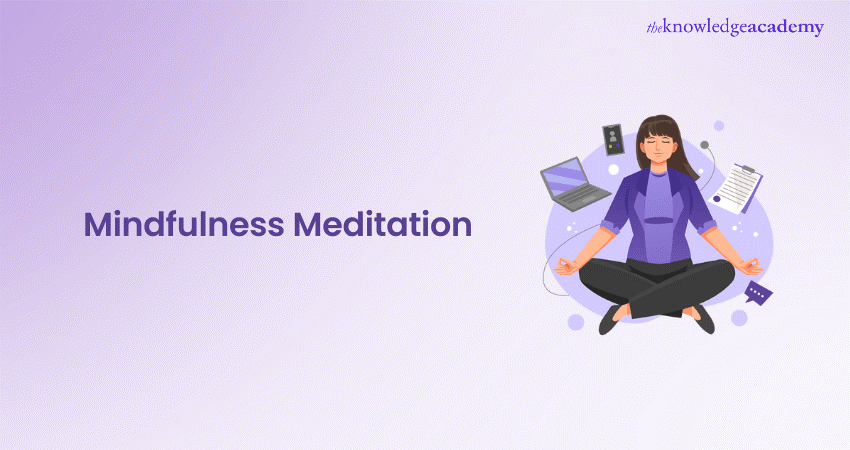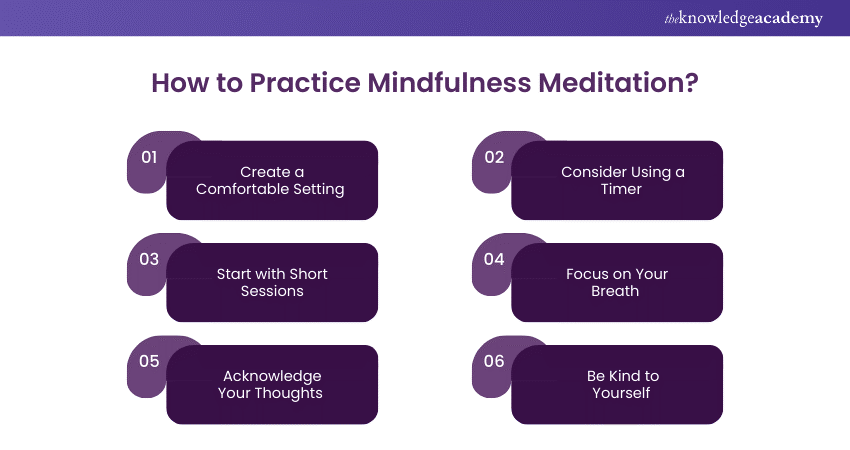We may not have the course you’re looking for. If you enquire or give us a call on + 1-866 272 8822 and speak to our training experts, we may still be able to help with your training requirements.
Training Outcomes Within Your Budget!
We ensure quality, budget-alignment, and timely delivery by our expert instructors.

Are you looking for ways to improve your mental clarity and emotional balance? Mindfulness Meditation is a powerful method that can greatly enhance your focus and overall wellbeing. Dive into the world of Mindfulness Meditation—a potent practice that turbocharges focus and nurtures overall well-being. Imagine stress melting away, replaced by a serene sense of stability.
In our blog, we unveil practical strategies and techniques to seamlessly integrate Mindfulness Meditation into your daily routine. Discover how to supercharge concentration and build mental resilience. Ready to embark on your mindful journey? Let’s dive in!
Table of Contents
1) What is Mindfulness Meditation?
2) How Does Mindfulness Work?
3) Benefits of Mindfulness
4) How to Practice Mindfulness Meditation?
a) Get Comfortable
b) Consider a Timer
c) Focus on Breathing
d) Notice Your Thoughts
e) Give Yourself a Break
5) Conclusion
What is Mindfulness Meditation?
Meditation can be simply defined as training your mind to achieve a state of calm, concentration, and positive emotions. Mindfulness, a popular meditation technique, consists of two main components: attention and acceptance.
a) Attention: Focus on the present moment by tuning into your experiences, such as your breath, thoughts, bodily sensations, and feelings.
b) Acceptance: Observe these sensations and feelings without judgment, noting them and letting them pass without reacting.
Mindfulness classes and therapies teach these concepts through breathing exercises, yoga, and guided lessons to enhance awareness of body sensations, thoughts, and feelings.
How Does Mindfulness Work?
Mindfulness involves focusing on sensations to anchor yourself in the present moment. It can be practised formally through meditation or informally during daily tasks like cooking, cleaning, or walking. In contrast, a busy mind keeps you disconnected from the present moment. The mind naturally thinks, analyses, and seeks stimulation—it's its default mode.
Mindfulness helps gently guide the mind back to the present moment, like nurturing a child. It's a practice of training the mind to settle and be present. With patience and self-compassion, repeated mindfulness practice teaches the mind to find stillness. Eventually, it may quieten entirely, allowing you to experience true presence without the filter of thoughts.
Understand how to tackle mental health problems with our Mental Health and Wellbeing Training – Register now!
Benefits of Mindfulness
Mindfulness Meditation involves approaching the world with curiosity and suspending judgment. When you meditate, it's with an attitude of kindness and openness towards yourself and others. It can be practiced anywhere you find peace and comfort.
This form of meditation requires mental discipline, wakefulness, and intention. It teaches you to observe your own thoughts and emotions objectively, free from automatic reactions. The focus is on noticing what arises without attempting to alter it, which can be particularly beneficial when dealing with challenging emotions.
Here are some benefits often associated with Mindfulness Meditation:
a) Enhanced Cognitive Abilities: Mindfulness Meditation can boost brain function by increasing activity in the left hemisphere and cerebral cortex. This can improve stress management, emotional regulation, and the sense of personal control.
b) Reduced Symptoms of Depression: Combined with cognitive therapy, Mindfulness Meditation helps prevent relapses in chronic depression. Addressing negative thought patterns promotes a healthier balance with more positive perspectives.
c) Support for Binge Eating Disorders: Mindfulness Meditation enhances self-awareness and self-control, aiding in the management of binge-eating behaviours.
d) Pain Management: Many people find greater relief from chronic pain through mindfulness techniques, enabling a more active lifestyle.
While Mindfulness Meditation benefits many individuals, it should complement rather than replace medical or mental health treatments. Consulting with your healthcare provider before integrating mindfulness into your treatment plan is advisable.
Enhance your emotional awareness and build stronger relationships with our Mindfulness Training – Join today!
How to Practice Mindfulness Meditation?
Learning Mindfulness Meditation can be straightforward to practice independently, but having a teacher or programme can be beneficial, especially for specific health goals. Here are some steps to help you begin on your own:

1) Create a Comfortable Setting
Find a quiet place where you can sit comfortably. Whether in a chair or on the floor, ensure your head, neck, and back are straight but relaxed. Comfortable, loose clothing can help minimise distractions.
2) Consider Using a Timer
While not essential, a timer with a gentle alarm can help you stay focused during meditation and prevent interruptions. This also helps in not meditating for too long. Allow yourself time afterwards to gradually reorient yourself.
3) Start with Short Sessions
Even a few minutes of meditation daily can have an impact. Begin with a brief 5-minute session and gradually increase to 10 or 15 minutes, eventually working up to 30 minutes if comfortable.
4) Focus on Your Breath
Direct your attention to your breath. Feel the sensation of air entering and leaving your body, noticing the rise and fall of your belly. Observe the temperature difference between inhaling and exhaling.
5) Acknowledge Your Thoughts
Rather than suppressing thoughts, practice observing them without attachment or judgment. Imagine thoughts as clouds passing through your mind—acknowledge them and gently return your focus to your breath each time.
6) Be Kind to Yourself
If your mind wanders into worry, fear, or hope, gently guide it back to the present moment without criticism. Returning to your breath is a core aspect of mindfulness practice.
Mindfulness Meditation is flexible and can be adapted to fit into your daily routine, helping to cultivate awareness and presence in your life.
Conclusion
Starting a Mindfulness Meditation practice might feel daunting, but even dedicating a few minutes each day can yield substantial benefits. Embrace the simplicity of being present, and you'll soon notice the positive impact on your mental clarity and emotional balance. Remember, consistency isn't as crucial as the intention to be mindful. Whenever you need a moment of calm, return to your practice and experience the profound difference it can make in your life.
Become familiar with various exercises and techniques for increasing mental strength with our Handle Stress and Develop Your Resilience Training.
Frequently Asked Questions

Results from Mindfulness Meditation vary, but some notice benefits like reduced stress within weeks. Regular practice enhances benefits over time.

Yes, Mindfulness Meditation pairs well with other relaxation techniques, including deep breathing or progressive muscle relaxation, enhancing overall relaxation.

The Knowledge Academy takes global learning to new heights, offering over 30,000 online courses across 490+ locations in 220 countries. This expansive reach ensures accessibility and convenience for learners worldwide.
Alongside our diverse Online Course Catalogue, encompassing 17 major categories, we go the extra mile by providing a plethora of free educational Online Resources like News updates, Blogs, videos, webinars, and interview questions. Tailoring learning experiences further, professionals can maximise value with customisable Course Bundles of TKA.

The Knowledge Academy’s Knowledge Pass, a prepaid voucher, adds another layer of flexibility, allowing course bookings over a 12-month period. Join us on a journey where education knows no bounds.

The Knowledge Academy offers various Mental Health Courses, including Mindfulness Training, Mental Health and Wellbeing Training, and Positive Psychology Course. These courses cater to different skill levels, providing comprehensive insights into Mindfulness.
Our Health & Safety Blogs cover a range of topics related to Mental Health, offering valuable resources, best practices, and industry insights. Whether you are a beginner or looking to advance your Health and Safety knowledge, The Knowledge Academy's diverse courses and informative blogs have you covered.







 Top Rated Course
Top Rated Course




 If you wish to make any changes to your course, please
If you wish to make any changes to your course, please


